Golden autumn is here again, with harvests, orange, yellow, and red leaves falling everywhere, apple cider, and so many pumpkins that we don’t know what to do with them. In olden days this would be the colorful background for harvest festivals, and the feast of All Saints leading into the glorious Michaelmas. Christians would give thanks to the Lord for the abundance of blessing He sends down to sinful mankind.
Unfortunately in America, the proverbial land of plenty, these blessings have a way of getting sidetracked, and we sometimes find the old pagan flavor of our British Isle roots tastier than the Christian ones.
A good example of this is Halloween. We are so used to it, it is such a part of our culture that Orthodox Christians with children are faced with a dilemma every time it rolls around. The older generation has nothing but pleasant memories of dressing up as princesses, mighty mouses, supermen, and various fairy tale characters to go gathering bags of perfectly sanctioned candy from our neighbors (who in those days we actually knew), bobbing for apples, taking hayrides, and just having fun.
Although it’s true, beginning in the sixties things sometimes went wrong. Living in a city I personally recall reports of needles inserted into apples given to innocent costumed tots, or candy laced with hallucinogenic drugs. Apparently some people preferred to execute the “trick” rather than the treat, and let their wicked side come out.
And there is the problem of witches, goblins, skeletons… With encouragement from Hollywood’s progressively unsparing special effects, children’s costumes have grown ever gorier.
We have become gradually desensitized to these things. But as Orthodox Christians, it would be educational to watch the reaction of other Orthodox Christians from countries that know nothing of Halloween. I remember, for example observing the horror on the faces of Ethiopian immigrants when encountering what they thought were normal Christians voluntarily dressing themselves and their children as ghouls. And I will never forget the reaction of a group of Orthodox Russians visiting the United States for the first time before the final fall of the Iron Curtain, fatefully at the end of October. Leering, sharp-toothed jack-o-lanterns, evilly grinning warty-faced witches on brooms, black cats, large hairy spiders, and skeletons adorning middle class lawns and doorways made their hair stand on end and their hands involuntarily dip into their pockets to search for their return tickets. Besides, people who know what it means to be hungry are particularly appalled by the widespread sacrifice of perfectly good pumpkins to… they can only surmise.
Still, Halloween is part of school programs. All the children are doing it, and we know how hard it is to get our children to swim upstream and ignore the heathenish customs of their peers. Rather than make light of this problem, we decided to ask some Orthodox priests in the United States who have to deal with this every year what they say to their own children and other families about Halloween. Our priests are very busy but we did get a few responses.
Fr. John Baker, rector of the Christ the Savior Orthodox Church (OCA) in Chicago, Illinois
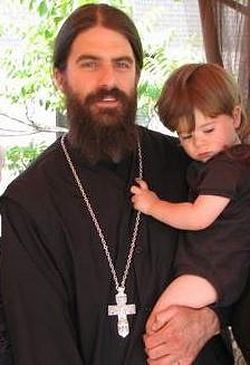 Fr. John Baker
Fr. John Baker
When we lived in the rural area of Pennsylvania our kids never went trick or treating. They didn't even know what Halloween was. I remember specifically a few times when we would go into a store or restaurant a few weeks before Halloween and the clerk asking my kids what they were going to be for Halloween. They didn't even know they were supposed to be something.
Here in Chicago it is quite different. My kids do go out trick or treating. We didn't the first couple years because we home schooled, but once they get into the schools it’s harder, especially for priest’s kids, because they are already set aside as being different.
I take them out trick or treating myself (no cassock. Only day of the year I do not wear it walking around the streets of Chicago). Last year we all dressed up, me included, as farmers. Overalls, cowboy hats, boots etc. No evil or dead stuff is the Matushka’s rule. We don't make a big deal about Halloween one way or the other, which I think is best. This only works though if they have a grounded family and spiritual life. If not, things can get goofy or very dark, very easily.
All that being said, the Greek Orthodox Convent of St. John Chrysostomos in Kenosha, Wisconsin has a St. Michael’s party [celebrated by them on November 8] instead of a Halloween celebration, which I would rather take my kids to. However, with city traffic this is often too far away to drive. I have noticed this year especially that Halloween seems to be turning more into a weeklong pagan festival than a night of trick or treating for kids. That is troubling to me.
Fr. John Whiteford, rector of the St. Jonah Orthodox Church (ROCOR) in Spring , Texas
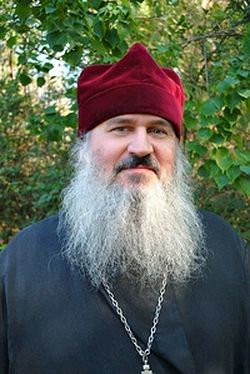 Fr. John Whiteford
Fr. John Whiteford
I think that some of the things said about the origins of Halloween paint a darker picture than is warranted. The word Halloween simply means the eve of All Saints, as it was celebrated in the west on the first of November. I remember as a child the celebration being a fairly innocent thing, in which we dressed up like cartoon characters, super heros, or pirates, and went around the neighborhood collecting candy. There certainly are pre-Christian elements that are associated with it, but this is also true of many Christian celebrations of holidays, such as using holly and mistletoe on Christmas.
However, since then, there certainly has been a paganization of Halloween, resulting in a much darker focus. And so I have never had my children participate in it, and have never encouraged participation in it, but I also hesitate to say that if someone wanted to celebrate it in the more innocent way that was once so common that this is strictly forbidden. I just would say that I think it is not wise to do so, given how things have developed in the culture.
Archimandrite Gerasim (Eliel), rector of the St. Seraphim Orthodox Cathedral (OCA), Dallas, Texas answered with his usual sense of humor:
Do you know why Jehovah’s witnesses and Mormons do not celebrate Halloween?
Because they can’t stand strangers knocking on their doors and bothering them.
Yes, it is touchy because it has become a very American institution. Most everyone remembers doing this as a child. Since it has become a mockery of Christian belief, it is still promoted in public schools as something not only normative but very delightful for children
And finally, Archimandrite Irenei (Steenberg), Dean of Monastic Life for the Western American Diocese (ROCOR), sent us this:
A brief word on Halloween, from a letter of Archimandrite Irenei to a mother and father (2012).
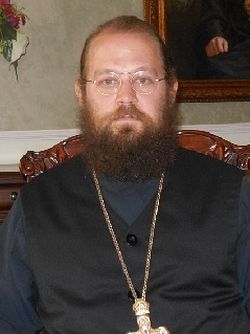 Archimandrite Irenei (Steenberg)
Archimandrite Irenei (Steenberg)
Some will say, “Ah, but it is only a bit of fun, these days. It’s just fancy dress. No one believes in these things!” But tell me, do you think the devil is so foolish that he does not see the opportunity that comes from something being perceived as “just fun and games”? Do you believe he does not understand that such circumstances cause us to let down our guard, to tease and toy with the very ideas of demons and spiritual darkness? That he does not rejoice precisely because such images become things of play, and therefore things that we do not guard against when the play is done? Yet others will say, “But it is not all macabre: children trick-or-treat in costumes of angels, of cartoon characters, of animals.” But this is to fail to see the point, that it is the very admixture of these two things—the playful and the demonic—that does such damage to the soul. The Scriptures say, What concord hath Christ with Belial? (2 Cor. 6.15), and yet modern man feels perfectly comfortable to join the demons to teddy-bears and unicorns; to mix the sinister with the trivial. This is because he has lost the sense of how powerfully our idle “play” affects the inner disposition of the heart. We think that if we don’t take something “seriously”, it cannot seriously affect us—but look how much woe and despair there is in the world, as the result of this delusion!
No, it is time to stand fast against this ridiculous trend. God has given you children; and now, in this very dilemma you are feeling in your heart, He is asking you how you will look after them. Will you, for the sake of “social norms”, start them at so precious and tender an age down the path of considering the spiritual world a realm of partying and jest, toying with images of evil as if they were of no consequence? Or will you spend this night teaching them of the joy of the spiritual life as it really is? “Halloween” (18th / 31st October) coincides with the eve of the feast day of our beloved pastor and illumined Father in the faith, St John of Kronstadt; and it is also the feast day of the pious virgin St. Frideswide of Oxford. Look, how God has planted for you two spiritual trees that can bear fruit in your family’s life on this very night. Take your children to the Divine Services; encourage them precisely in the fact of doing something that others are neglecting—that while the world outside plays about in the frivolities of delusion and mixes demons with daydreams, you will enter into the Holy Temple where the God of all spirits dwells, to receive the Holy Spirit and be joined into a life that turned a parish priest into a clairvoyant miracle worker and a meek young woman into a wonder-working healer! And teach your children that He longs to do the same for them, that He desires to make of them great saints whom the whole world will know, if only they, and you, will let Him.
May God give you strength to stand steadfast with joy amidst these worldly trials! May He bless you, and bless your children.

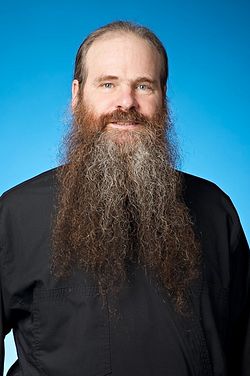
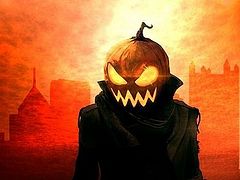
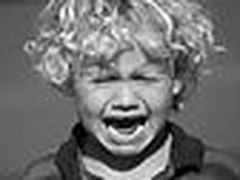
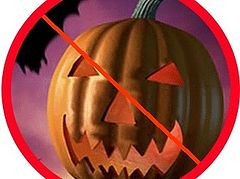
It was always an innocent, fun harvest celebration when I was a child, but now the emphasis on sexual and really gross costumes has grown, as well as visits to psychics, etc.
It is possible to celebrate without dipping into the occult and macabre
This judgmental, Anti-western stance just because it isn't celebrated in the Middle East or Russia is a bit insulting.
I'm tired of all the holier than thou Eastern Eureopean Orthodox sentiments against everything Bing they don't understand.